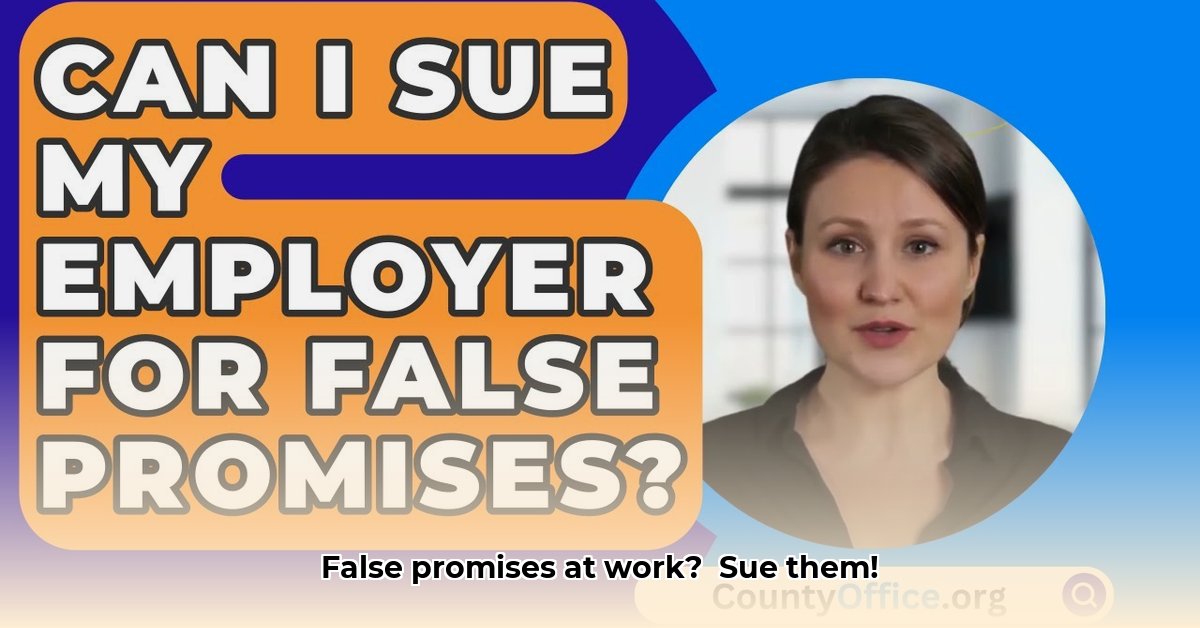
Did your employer make promises they didn't keep? Feeling misled and unsure of your legal options? This guide explains how much you might be able to sue your employer for broken promises and provides actionable steps to protect your rights. Remember, this is for informational purposes only, and you should always consult with an employment law attorney for personalized advice.
Understanding Your Legal Options: More Than Just a Lawsuit
Before considering a lawsuit, explore less confrontational options. Mediation, involving a neutral third party to facilitate an agreement, can often resolve disputes quickly and affordably. However, if informal methods fail, you might pursue legal action based on breach of contract or promissory estoppel.
Breach of Contract: The Written (or Spoken) Agreement
This applies if you had a formal employment agreement—written or verbal—containing specific promises your employer broke. Solid proof is essential: a copy of the contract and evidence demonstrating the breach. Mere hearsay won't suffice.
Promissory Estoppel: Promises That Bind, Even Without a Contract
Even without a written contract, you might have recourse through promissory estoppel. This legal principle protects individuals who relied on a significant promise—to their detriment—even if that promise wasn't part of a formal agreement. For example, if a promotion promise led you to reject another job offer, and the promotion was subsequently withdrawn, you might have grounds for a claim.
How Much Compensation Can I Expect?
Determining the potential compensation amount is complex. Several factors influence the outcome:
- Significance of the Promise: Was it a minor detail or a major life-altering decision, such as a substantial raise or promotion significantly impacting your career trajectory?
- Demonstrable Losses: Did you experience income loss, benefits reduction, missed opportunities, or increased expenses due to the broken promise? Did you suffer emotional distress? Quantifiable losses strengthen your claim.
- Evidence Quality: Strong evidence—contracts, emails, witness testimonies—is crucial. The more concrete your proof, the better your chances of a substantial award.
- Your State's Laws (Jurisdiction): State laws vary significantly. Legal requirements and compensation possibilities differ from state to state.
Potential compensation might include lost wages, benefits, bonuses, expenses incurred, and emotional distress damages. Punitive damages—intended to punish the employer—are possible in certain cases, though not guaranteed.
Building a Strong Case: A Step-by-Step Guide
Follow these steps to maximize your chances of success:
- Gather Evidence Thoroughly: Collect all relevant documents: emails, contracts, performance reviews, witness statements. Maintain meticulous records.
- Seek Legal Counsel Promptly: An employment lawyer can assess your situation, advise on the best course of action, and estimate the likelihood of success and associated costs.
- Consider Alternative Dispute Resolution (ADR): Mediation or arbitration can offer faster, more affordable resolutions than a full-blown lawsuit.
- File a Lawsuit (If Necessary): If other methods fail, and your lawyer advises that you have a strong case, a lawsuit might be necessary. Understand that litigation can be lengthy and costly.
Navigating Potential Risks: A Realistic Assessment
| Risk Factor | Likelihood | Mitigation Strategy |
|---|---|---|
| Insufficient Evidence | High | Meticulously document everything; obtain witness statements; preserve all communications. |
| Ambiguous Contract Terms | Moderate | Seek legal counsel to clarify contract ambiguities. |
| Statute of Limitations Issues | Moderate | Act quickly; contact a lawyer immediately to avoid missing filing deadlines. |
| Robust Employer Defenses | Moderate | Anticipate employer defenses and prepare counterarguments with your lawyer. |
Key Takeaway: The amount you can recover is case-specific. Your evidence, the broken promise's nature, your losses, and your state's laws all contribute to the outcome. Early legal consultation is strongly recommended to protect your rights and explore available options.
Choosing Between Promissory Estoppel and Breach of Contract
Determining the appropriate legal path—promissory estoppel or breach of contract—depends on the circumstances. A breach of contract claim demands a formal agreement (written or documented verbal), while promissory estoppel addresses situations where a promise, even without a formal contract, caused harm due to reliance. Strong evidence—emails, texts, witness testimonies—is crucial regardless of chosen route.